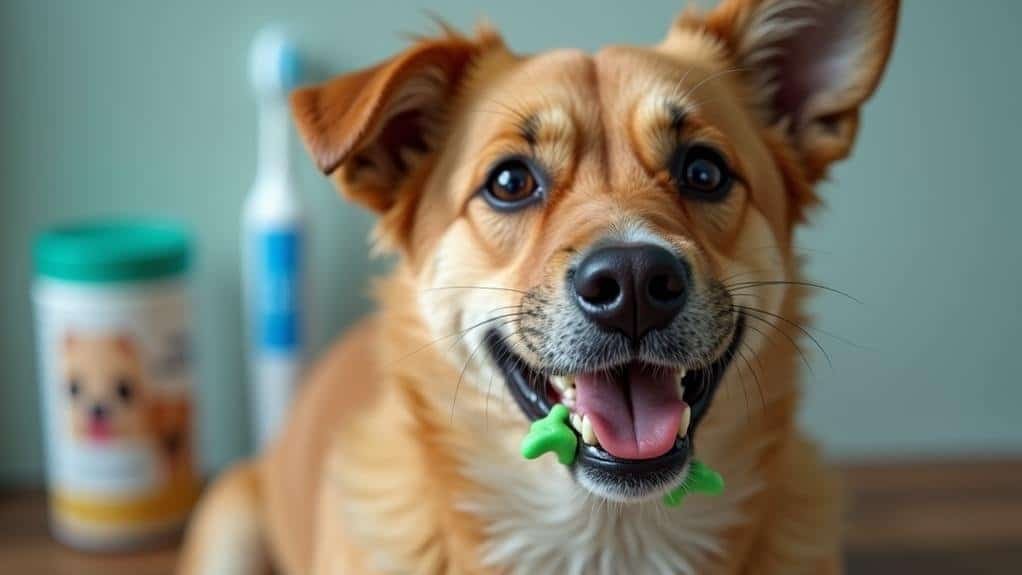Your dog's breath smelling like poop can stem from various causes. Dental issues like periodontal disease or tooth decay are common culprits, allowing bacteria to thrive. Systemic problems, particularly kidney or liver disease, can also lead to foul breath. Diet plays a role too; low-quality food or eating garbage can contribute to the odor. To address this, prioritize regular dental care, including brushing and professional cleanings. Offer dental chews and high-quality food to support oral health. If the smell persists despite these efforts, it's essential to consult your vet, as it may signal an underlying health concern requiring prompt attention. Understanding the root cause is key to finding an effective solution.
Common Causes of Foul Breath
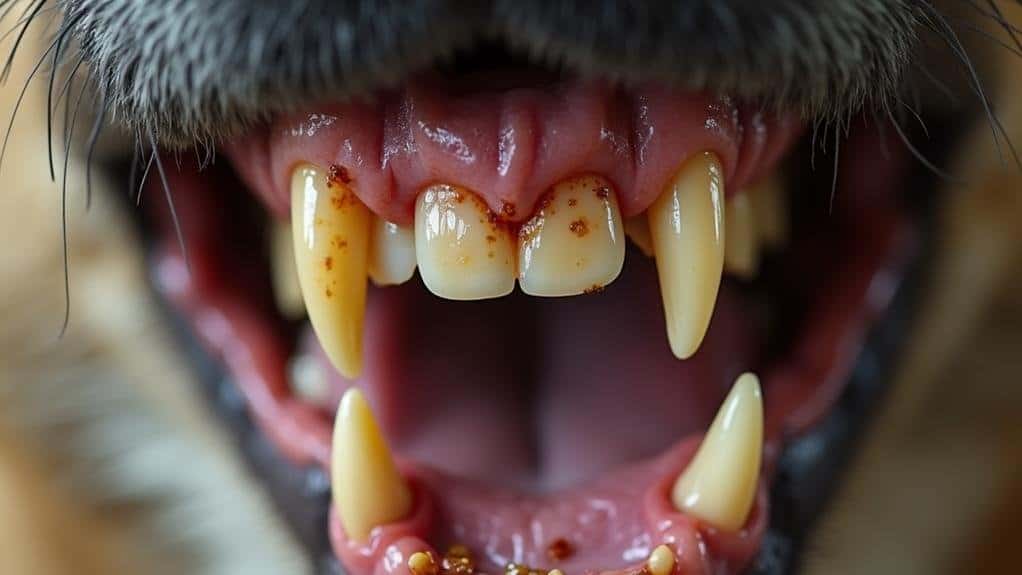
The stench of foul dog breath can be more than just an unpleasant experience; it's often a warning sign of underlying health issues. When your dog's breath smells particularly bad, especially like poop, it's vital to take into account several potential causes.
One common culprit is poor oral health. Bacteria and plaque buildup in your dog's mouth can lead to periodontal disease and tooth decay, resulting in foul odors. Regular dental care is essential to prevent these issues and maintain fresh breath.
Kidney disease can also cause bad breath in dogs. As toxins accumulate in the body, they can produce a fecal-like odor. Similarly, liver disease may lead to a distinct foul odor, often accompanied by other symptoms like vomiting and diarrhea.
Some dogs engage in coprophagia, or eating feces, which can directly cause their breath to smell like poop. This behavior may indicate nutritional deficiencies or other health problems.
If you notice persistent bad breath in your dog, it's important to consult with a veterinarian. They can help identify the underlying cause and recommend appropriate treatments, which may include dental cleanings, dietary changes, or addressing more serious health concerns.
Kidney Disease and Bad Breath
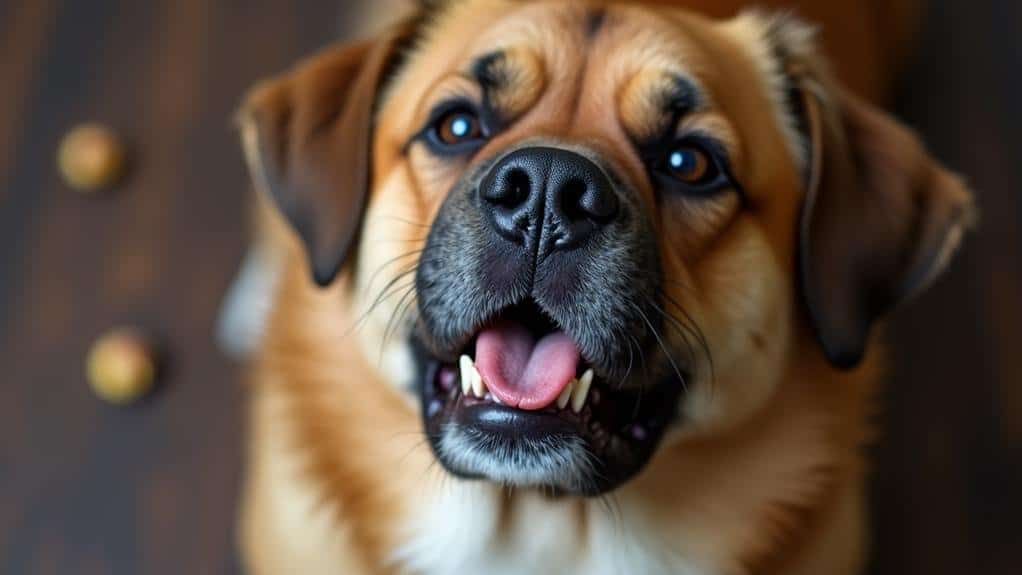
When your dog's breath smells like feces, it's time to contemplate kidney disease as a potential culprit. Poor kidney function leads to toxins accumulating in your dog's body, causing a distinct fecal or urine-like odor in their breath. This foul smell isn't just unpleasant; it's a warning sign of a serious health issue that requires immediate attention.
Kidney disease often presents with other symptoms, including:
- Vomiting and diarrhea
- Unexplained weight loss
- Changes in water consumption and urination habits
- Lethargy and decreased appetite
Don't ignore these red flags. Early detection is vital for effective management of kidney disease. If you notice any of these symptoms alongside bad breath, schedule a veterinary evaluation right away.
Your vet may recommend dietary changes and medications to support your dog's kidney function and manage the condition.
Regular check-ups and health monitoring are essential to catch kidney issues before they lead to severe complications. By staying vigilant and addressing bad breath promptly, you can help protect your dog's health and potentially add years to their life.
Liver Problems and Odor Issues
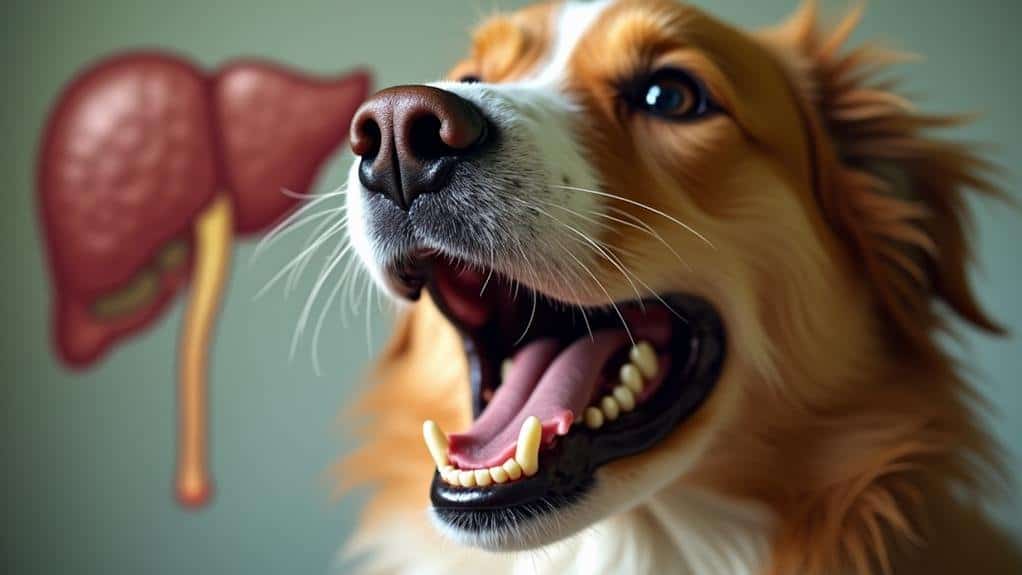
Similar to kidney disease, liver problems can often manifest as foul-smelling breath in dogs. If your dog's breath has a particularly unpleasant odor resembling feces, it could be a sign of liver dysfunction. This smell is caused by the accumulation of toxins in your dog's body when the liver isn't functioning properly.
It's essential to pay attention to this odor, as it can be a vital indicator of underlying health issues. Liver problems can lead to severe complications if not diagnosed early, so don't ignore this symptom.
Along with the foul breath, you might notice other signs like vomiting, diarrhea, and jaundice.
If you suspect your dog has liver issues, seek veterinary care immediately. Your vet will perform a thorough examination and may recommend tests to confirm the diagnosis.
Treatment options for liver problems typically include dietary changes, medications, and regular monitoring. Early intervention is key to managing the condition effectively and improving your dog's overall health.
Dental Health and Breath Odor
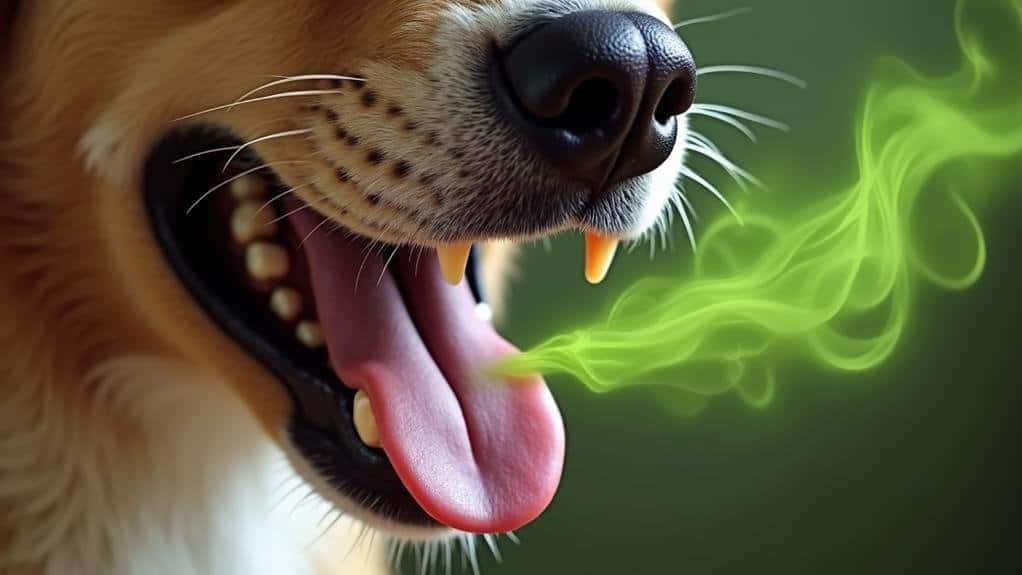
For most dogs, dental health issues are the primary culprit behind bad breath.
Periodontal disease, characterized by plaque and tartar buildup, harbors harmful bacteria that produce foul odors. To combat this common problem and maintain your dog's oral hygiene, you'll need to take a proactive approach.
Regular professional cleanings by a veterinarian are vital for removing tartar and preventing the progression of gum disease.
Between these visits, daily tooth brushing is important for eliminating plaque and food debris that contribute to bad breath.
Dental chews and toys designed for oral health can also help reduce plaque accumulation and freshen breath.
To guarantee your dog's dental health and prevent bad breath:
- Brush your dog's teeth daily using canine-specific toothpaste
- Schedule regular professional cleanings with your veterinarian
- Provide dental chews and toys to promote oral hygiene
- Monitor for signs of dental issues, such as swollen gums or difficulty eating
Dietary Factors Affecting Breath
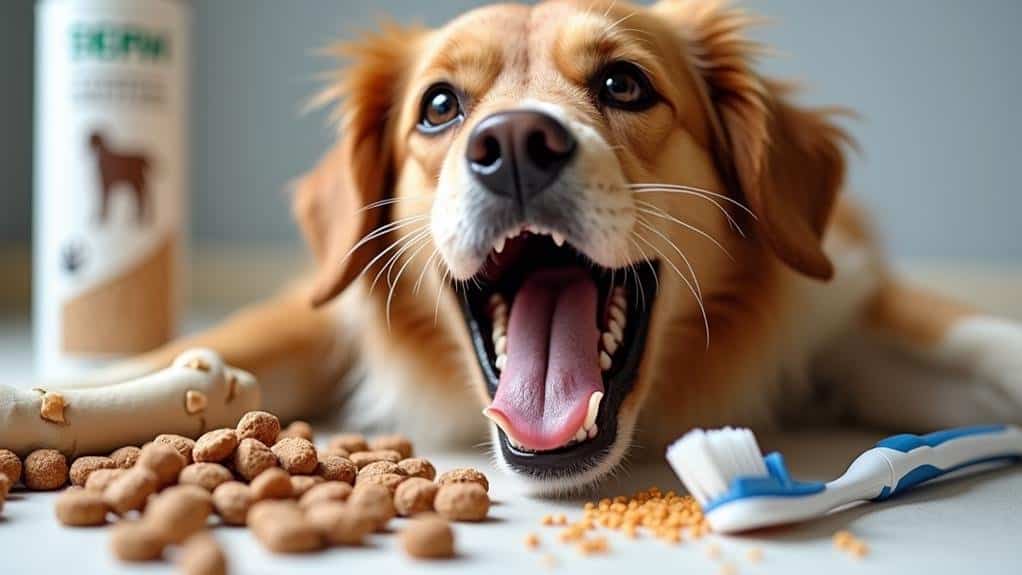
Beyond dental health, your dog's diet plays an essential role in breath odor. If your furry friend consumes low-quality food or has access to garbage, they may develop bad breath due to ingesting decomposing materials and offensive substances.
Diets high in protein can increase bacteria production in the mouth, contributing to foul breath if not managed with proper dental care.
It's vital to be aware that certain human foods, like onions and garlic, are toxic to dogs and can lead to digestive issues, resulting in breath that smells like feces.
To combat these dietary factors, consider feeding your dog with dental health in mind. Specialized dental diets or chews can help reduce plaque buildup and improve breath odor.
When introducing new foods to your dog's diet, monitor their effects on breath carefully. Some ingredients may cause gastrointestinal disturbances and unpleasant odors.
By paying attention to your dog's dietary intake and choosing high-quality foods, you can greatly impact their breath odor.
Remember that a balanced diet, combined with proper dental care, is key to maintaining fresh breath in your canine companion.
Home Remedies for Stinky Breath
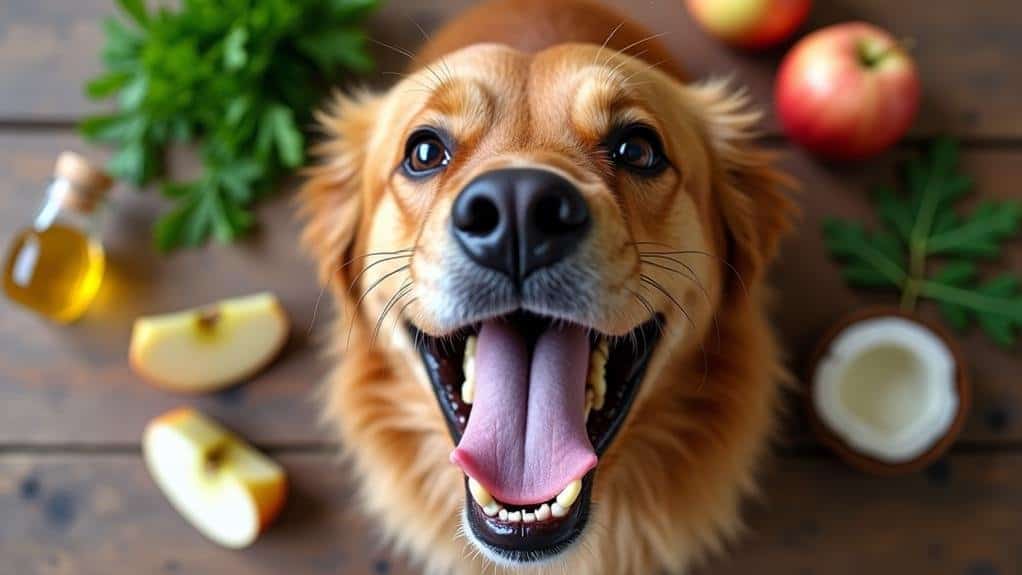
While professional dental care is essential, there are several home remedies you can try to combat your dog's stinky breath. Regular brushing is vital in preventing plaque buildup, a common cause of bad breath in dogs. Aim to brush your dog's teeth daily using pet-safe toothpaste to maintain peak oral health.
Dental chews and toys designed for oral care can help remove food particles and reduce bacteria, leading to fresher breath. You can also try homemade breath fresheners by adding small amounts of parsley or mint to your dog's food, as these herbs have natural odor-neutralizing properties.
Make sure your dog always has access to fresh water, as proper hydration helps flush out bacteria and food debris from the mouth. Consider making dietary adjustments by switching to high-quality dog food that supports dental health and minimizes odor-causing ingredients.
To prevent bad breath and maintain your dog's oral health:
- Establish a daily tooth-brushing routine
- Provide dental chews and toys regularly
- Experiment with natural breath-freshening herbs
- Guarantee proper hydration and a balanced diet
Professional Veterinary Treatment Options
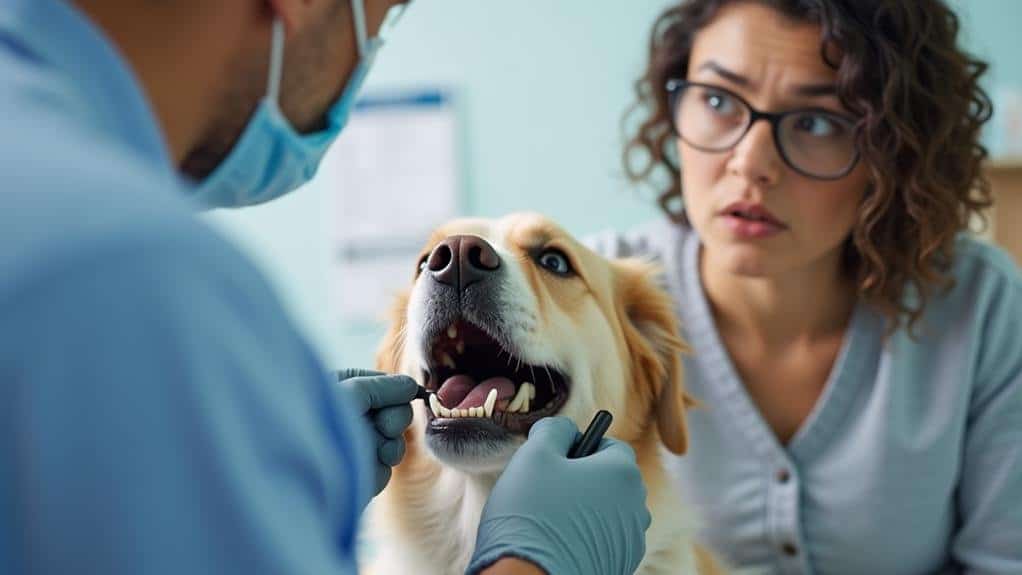
Home remedies can be helpful, but sometimes your dog's breath issues require professional intervention. If your dog's bad breath persists or smells like feces, it's vital to seek veterinary care.
A thorough veterinary examination is necessary to identify any underlying health conditions, such as kidney or gastrointestinal issues, that may be causing the problem.
Based on the diagnosis, your vet will develop tailored treatment plans. These may include medications, dietary changes, or even surgical interventions for serious conditions.
Professional dental cleanings are often a key component of addressing bad breath, as they remove plaque buildup and tartar that contribute to oral health problems.
Your veterinarian will also provide preventative care recommendations to maintain your dog's oral health and reduce the likelihood of future bad breath issues. These may include specific dental chews or specialized diets.
Regular monitoring and follow-up appointments are important to track the progression of any underlying health issues and guarantee the effectiveness of the treatment plan.
Prevention Strategies for Fresh Breath
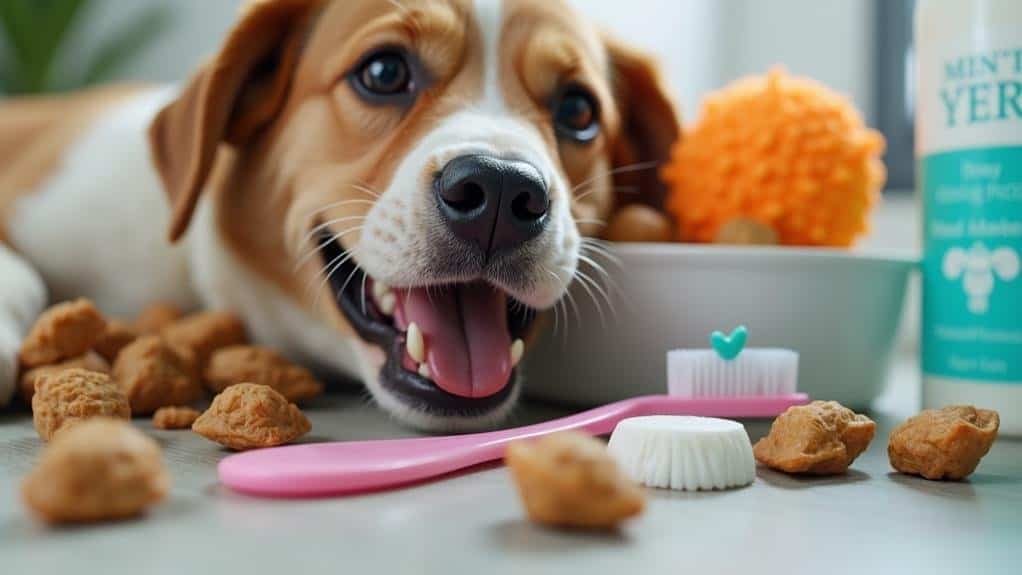
How can you guarantee your dog's breath stays fresh? The key lies in implementing effective prevention strategies that focus on routine dental care and overall health maintenance.
By incorporating regular professional cleanings, daily brushing, and dental chews into your dog's oral hygiene routine, you'll greatly reduce plaque buildup and combat bad breath.
Start early with consistent dental care to foster good habits and minimize the risk of developing breath issues.
Monitor your dog's diet closely, ensuring they don't have access to garbage or foul-smelling substances that can contribute to unpleasant odors.
Additionally, schedule regular veterinary check-ups to detect and address any underlying health issues that may cause bad breath.
To maintain your dog's fresh breath, follow these essential steps:
- Establish a daily oral hygiene routine, including brushing and dental chews
- Schedule professional cleanings at least once a year
- Provide specially formulated dog foods that promote dental health
- Monitor your dog's diet and environment to prevent access to odor-causing substances
When to Seek Immediate Help
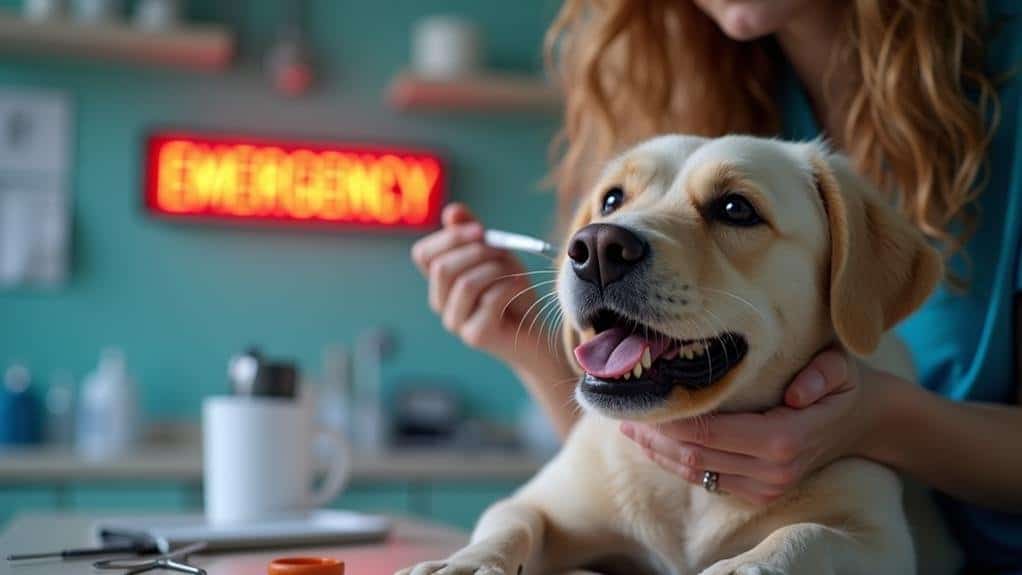
Most dog owners can manage routine dental care at home, but certain situations require immediate professional attention. If your dog's breath suddenly smells like feces, it's a red flag that shouldn't be ignored. This unusual odor may indicate severe kidney dysfunction or digestive issues, warranting immediate veterinary evaluation.
Don't wait to seek help if your dog's bad breath is accompanied by symptoms like vomiting, diarrhea, or changes in appetite. These signs, combined with foul breath, necessitate an urgent vet visit.
Even if your dog's breath is persistently unpleasant despite regular dental care, it's time to consult a professional, as this could suggest underlying dental disease.
Be alert for signs of oral pain or discomfort, such as difficulty eating or swollen gums. These symptoms, along with bad breath, may signal serious health concerns that require prompt attention.
Frequently Asked Questions
How Do You Cure Bad Breath That Smells Like Poop?
You'll need to consult a doctor to identify underlying health issues. Improve oral hygiene by brushing regularly and using mouthwash. Adjust your diet, stay hydrated, and monitor your overall health. Professional dental cleanings can also help eliminate foul breath.
What Is the Best Cure for Smelly Dog Breath?
To cure your dog's smelly breath, you'll want to focus on dental hygiene. Brush their teeth daily, provide dental chews, and schedule regular professional cleanings. You can also try a dental-specific diet and make certain they're drinking enough water.
Why Does My Dogs Breath Smell Like Rotting Garbage?
Your dog's breath smells like rotting garbage due to bacteria buildup from food particles, oral health issues, or exposure to decomposing materials. It's also possible that underlying medical conditions are causing this foul odor. You'll need to address these issues promptly.
What Disease Is Associated With Feces Smelling Breath?
If your dog's breath smells like feces, it's often associated with kidney disease. However, liver disease, gastrointestinal disorders, and dental issues can also cause this odor. Don't ignore it; consult your vet for a proper diagnosis.
Conclusion
You've learned about the various causes of your dog's foul breath, from dental issues to serious health problems. Don't ignore this symptom, as it can indicate underlying conditions. Try home remedies and preventive measures, but don't hesitate to consult your vet if the problem persists. Remember, your furry friend can't tell you what's wrong, so it's up to you to stay vigilant and take action when needed. Fresh doggy breath leads to happier snuggles!

